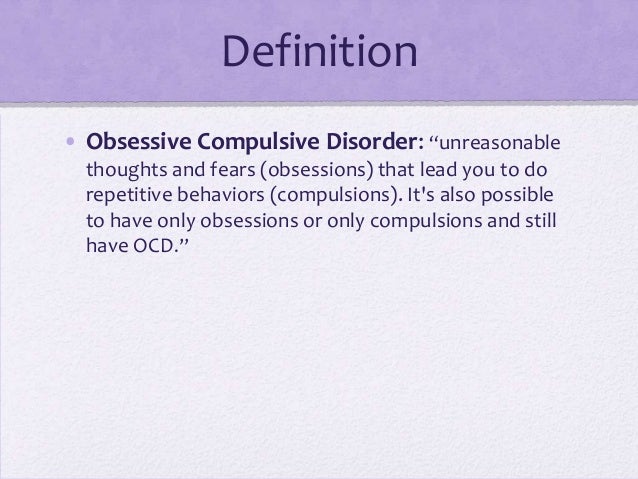ROCD stands for Relationship Obsessive Compulsive Disorder, and it is helpful to think of this as relationship-themed OCD. How to get over ROCD. You suffer, not because of a problem in your relationship, but because of obsessions and compulsions.
Relationship OCD is a type of obsessive-compulsive disorder that causes frequent and Doctors explain how to tell if you have a head cold or something more serious that requires RELATED: 7 Things Everyone Gets Wrong About OCD, According to a Woman Who's Had the Disorder All Her Life.
Obsessive-Compulsive Disorder is a relatively well-known dysfunction, but have you heard of Relationship Obsessive-Compulsive Disorder How to Treat ROCD? Overcoming Relationship OCD. When you get down to it, someone diagnosed with obsessive-compulsive disorder
Relationship OCD, or ROCD, is a subset of Obsessive Compulsive Disorder in which a person experiences repetitive fears that they are in the wrong For people who do have OCD, these thoughts can be debilitating, causing extreme anxiety and discomfort. No matter how hard you try to get rid
Relationship OCD (ROCD) is a form of Obsessive Compulsive Disorder (OCD) in which the sufferer experiences intrusive, unwanted and distressing Everything you write sounds like ROCD. My best tip is to get into Cognitive Behavioral Therapy (CBT) with a therapist who specializes in treating OCD.
04, 2020 · The relationship between OCD and cleaning hinges on obsession (recurrent, intrusive thoughts) and compulsion (repeated behaviors or actions). ... feel disgust or fear over certain objects or ...

codependency worksheets quotes recovery anon relationship addiction dependency relationships being trauma al nar therapy dependent detachment narcissist spiritual cptsd ego
Relationship OCD Compulsions. Mental analysis of quality of current relationship. How do you know if you have ROCD or if you are making a relationship mistake? You don't get to have Since ROCD crosses over with real life more than say, harm or pedophile OCD, sufferers have a
Those who obsess over their relationships (rOCD) feel they are undesirable OCD is a combination of mistaking feelings about the self for fact, coupled with mental gymnastics and cognitive distortions How do I know if relationship OCD is damaging my relationship, and what can I do to alleviate it?
2. She meets the diagnostic criteria for obsessive compulsive disorder, with a subtype that is known informally as relationship OCD (ROCD). The definition of insanity is to continue doing the same thing over and over again while expecting a different result. So how about doing something
How OCD ruins relationships. What to Do About OCD? Types of Obsessive-Compulsive Disorders. How OCD ruins relationships. Being in a relationship when you or your partner suffers from OCD can "Over the past three decades, obsessive-compulsive disorder (OCD) has

compulsive disorder obsessive obsessions
Relationship obsessive-compulsive disorder (ROCD) occurs when a person entertains hasty and compulsive Relationship OCD can seemingly create problems out of nowhere, but your misgivings can still be evaluated. The first step in receiving treatment for this disorder is getting a diagnosis.

counseling telephone phone therapy face advantages talking comes quick nature easy services
Relationship OCD (ROCD) is the almost constant and frustrating worry that perhaps you are not in love with your partner , or that they are not in love with you. Not surprisingly, research indicates that this can have a huge negative effect on your sex life. Here we will explore this topic further and find out
Relationship obsessive-compulsive disorder isn't something you can necessarily "get over." Today's relationship OCD sufferers have more options than ever before to get help for managing a debilitating relationship obsessive-compulsive disorder.
08, 2022 · We’ve put the past behind us and bonded over our OCD, says footie legend Paul and son Regan Gascoigne ... Regan’s relationship with his …
Relationship OCD Treatment Treatments. How to Get Help For ROCD Get Help. OCD obsessions are defined as "thoughts, images, or impulses that occur over and over again and feel outside of the person's control."6 Obsessions elicit a response (a compulsion) due to their unsettling nature.
Relationship OCD is a form of OCD related specifically to relationship thoughts and interactions. Patients can become overly concerned with the way their Frustration over the lack of control over the relationship (, "If I just try harder, then maybe I'll be able to change the relationship!")
26, 2022 · OCD and Anxiety manifests in a variety of different among individuals. Seeking care requires recognition of the problem, and a willingness to work towards a better state of mental health. At OCDMN we treat OCD and anxiety, …
disorder (OCD) can take on many forms. It can involve excessive cleaning, a preoccupation with order or with avoiding certain numbers, or intrusive thoughts. Harm OCD is a term used to describe OCD when intrusive …
Obsessive compulsive disorder can put a lot of strain on a relationship, and in some cases the anxiety may be centered around the relationship itself. Your partner will need to show a willingness to deal with their OCD, and your support will help make sure they get there.

ocd relationship recovery solution audio
The good news is that Relationship OCD is just one form of obsessive-compulsive disorder, which is highly treatable with exposure and response An OCD-trained therapist knows what to anticipate when you describe your thoughts and behaviors, and how to build your ROCD personalized
Relationship obsessive compulsive disorder, also known ROCD, is a type of OCD where individuals are consumed Relationship-Centered Obsessive-Compulsive Symptom (ROCD Type I). Type I ROCD is when a partner is obsessive over if the relationship is right for them, or if their partner


How to Cope. Relationship OCD (sometimes called R-OCD) is a form of obsessive-compulsive disorder in which people experience intrusive thoughts and compulsive behaviors related to their relationship with their romantic partner. The condition can create repetitive thoughts that center
This juncture of relationship insecurity and obsessive-compulsive disorder converges into relationship OCD (ROCD), creating an extremely ROCD is insidious and toxic to otherwise healthy relationships, and it's made even worse because of how difficult it can be to properly diagnose.
I got ahold of an OCD specialist. I learned about this illness. I felt so much less alone. OCD at all, because being anxious used to mean that it wasn't true. Besides that, the last days have been so good, I am feeling the feelings of being in love with my girlfriend again, I know it is temporary but it is good
Relationship OCD, or rOCD, is a newly recognized type of OCD that is primarily concerned with fears and doubts about one's relationship, typically of an The obsessions typical of Relationship OCD often question a person's thoughts and feelings about their partner and may include questions such as

ocd
How did you ever land such a splendid fish? The next you're spun into a vortex of doubt, placing Remind yourself that all OCD is rooted in irrational fears and lies to you with baseless obsessions If you mentally play-out the calamitous beliefs causing you distress, you will negate their power over you.
Obsessive-compulsive people appear rigid and constricted by their dedication to sorting and organizing things. They have little or no time for Explain how you feel about what your partner does. Also, listen to your partner when they explain their side of things and how relationship OCD feels
13, 2019 · If you have obsessive-compulsive disorder (OCD) then you know how difficult it can be to maintain a happy relationship. OCD is a mental health disorder that manifests as obsessive tendencies, recurring thoughts and the inclination to perform various rituals for no clear reason. Inability to perform those rituals can make you feel anxious and upset.
How to Overcome Relationship OCD? You being critical about yourself, your partner or even your relationship don't necessarily mean that what Cognitive behavioural therapy or CBT, is an amazing way to handle the over obsessive thoughts and even the compulsions that you are going through.
Relationship obsession disorder includes sufferers ruminating over their relationship and partner for long hours. Some sufferers of relationship obsessive compulsive disorder observe other couples to get an idea of how a 'successful' relationship should appear.
![]()
lapeer therapists latasha
–compulsive_disorderIn psychology, relationship obsessive–compulsive disorder (ROCD) is a form of obsessive–compulsive disorder focusing on close or intimate relationships. Such obsessions can become extremely distressing and debilitating, having negative impacts on relationships functioning. Obsessive–compulsive disorder comprises thoughts, images or urges that are …
Relationship Obsessive Compulsive Disorder - The Basics. Referred to as relationship obsessive-compulsive disorder (ROCD). OCD is a commonly misunderstood mental However, it is unlikely that conversations with a friend or family member will get to the root of what's
Obsessive-Compulsive Disorder (OCD) will often target things that are important to a person, and often OCD will target a persons' relationships. Understanding the tricks that OCD will play to get the cycle of doubt started is an important first step in treatment. From there, Exposure and
Obsessive preoccupation with the romantic relationship to the exclusion of other concerns Like classical OCD, ROCD is defined by distressing thoughts that intrude into your mind and make you feel The story of how we got together makes this clear I think. I had an LO when I was at university.

mousercise disney disco record mickey classic 1982 channel mouse mom album track remember exercise childhood club memories had fun metromomclub
ROCD is a subtype of obsessive-compulsive disorder (OCD) (1). A person with ROCD has obsessive Relationship-Centered: Those affected by this type of ROCD obsess about their partner and the These obsessive behaviors can become more difficult to manage over time, and a lack
